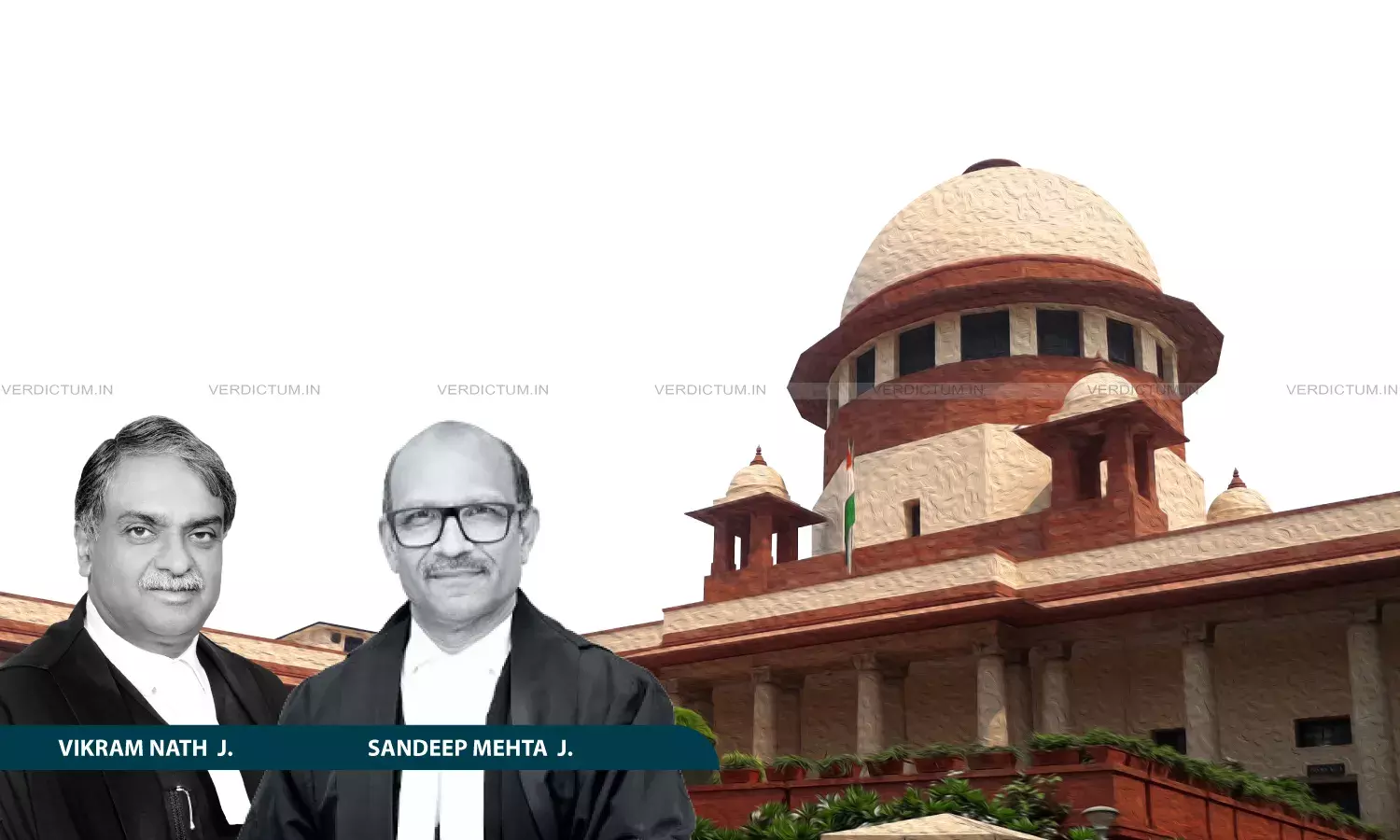Can’t Quash Proceedings Based On Compromise Where Loss To Public Exchequer Is Evident: Supreme Court Restores Corruption Case Against Company
The appeal before the Supreme Court was filed at the instance of the Central Bureau of Investigation against the judgment of the Punjab and Haryana High Court allowing a petition filed under Section 482 of the Code of Criminal Procedure.

Justice Vikram Nath, Justice Sandeep Mehta, Supreme Court
While restoring the proceedings under the IPC and the Prevention of Corruption Act against a construction company, the Supreme Court has reiterated that quashing of proceedings of a criminal case on the strength of a compromise is prohibited where there is a loss to the public exchequer.
The appeal before the Apex Court was filed at the instance of the Central Bureau of Investigation against the judgment of the Punjab and Haryana High Court allowing the petition filed under Section 482 of the Code of Criminal Procedure, 1973, [Section 528 of the Bharatiya Nagarik Suraksha Sanhita, 2023 (BNSS)] by the respondent -M/s. Sarvodaya Highways Ltd and its Directors (respondents 2 to 5) in a case registered under Section 120B read with Sections 406, 420, 467, 468 and 471 of the Indian Penal Code, 1860 and Section 13(2) read with 13(1)(d) of the Prevention of Corruption Act, 1988.
The Division Bench of Justice Vikram Nath and Justice Sandeep Mehta stated, “On going through the aforesaid judgments, we find that this Court did not consider the judgment in the case of Gian Singh (supra) which expressly prohibits quashing of proceedings of a criminal case on strength of a compromise where loss to public exchequer is evident and the offences under the PC Act, 1988 are applied.”
ASG Vikramjit Banerjee represented the Petitioner, while Senior Advocate Siddarth Dave represented the Respondent.
Factual Background
The FIR was lodged at the instance of the Branch Manager of the erstwhile State Bank of Bikaner and Jaipur (now merged with State Bank of India), alleging that the Bank had sanctioned a credit facility of Rs 50 crore under fund based-limits and Rs 10 crore under non-fund-based limits to the respondent Company through its Managing Director. While applying for the loan, it was projected on behalf of the Company that it was engaged in the construction of residential/commercial complexes, townships, highways across India and had been awarded 10 work orders to the tune of Rs 24 crores. Acting on the aforesaid information, the Bank sanctioned the credit facilities.
When the amounts were not repaid as per the schedule, an internal inquiry was initiated, and the account of the respondent Company was declared to be a Non-Performing Asset. The internal inquiry concluded that a fraud of Rs 52.5 crore had been committed. Consequent to these findings, a complaint was lodged by the Branch Manager based on which the FIR was registered with the appellant-CBI. The investigating agency concluded that the officers of the respondent Company and the then Branch Manager of the Bank had connived together to defraud the Bank.
Sanction was granted by the Competent Authority to prosecute the Bank Manager, and pursuant to the conclusion of the investigation, charge sheet was filed in the Court of the Special Judge for CBI9, Panchkula, Haryana against the respondent Company, its Directors and the Bank Manager. The Company claimed to have entered into a one-time settlement with the Bank. The cash credit liability was settled on payment of Rs 41 crore to the Bank. It was based on this one-time settlement that the respondent defaulting company and its Directors, approached the High Court by way of a petition under Section 482 of the CrPC. The Single Judge quashed the proceedings arising from the chargesheet. Aggrieved thereby, the appellant CBI approached the Apex Court.
Reasoning
On a perusal of the reasons assigned by the High Court, the Bench noted that while quashing the proceedings on the basis of one-time settlement, the High Court failed to advert to some vital facts of the case which were duly established during the investigation. There was a specific finding in the chargesheet that the defaulter company, through its directors had submitted fabricated documents and misrepresented to the Bank for the purpose of procuring the cash credit facility.
The High Court did not take into account the fact that the appellant-CBI, on the basis of evidence collected during the investigation, found that the offences of criminal conspiracy, fabrication of documents, and the offences under the PC Act, were clearly made out. As per the Bench, the High Court also did not take into account the fact that the amount of settlement under the one-time settlement did not cover the actual amount due to the Bank and that there was a deficit of more than 5 crores plus interest, which was a direct loss to the public exchequer.
“The High Court, while exercising jurisdiction under Section 482 CrPC, did not consider these vital facts and quashed the proceedings merely on the basis of the alleged one-time settlement. The blanket order quashing the chargesheet in its entirety would have the effect of terminating the prosecution against the Bank Manager as well, against whom prosecution sanction has been granted”, it added.
Considering the fact that one-time settlements are effected under circumstances where the Bank under duress is compelled to accept a lesser amount in order to secure the maximum possible recovery against the defaulting account, the Bench mentioned, “In this background, we feel that the High Court committed error apparent in the eyes of law by quashing the proceedings.”
Thus, allowing the appeal, the Bench restored the proceedings before the trial Court.
Cause Title: Central Bureau of Investigation v. M/s Sarvodaya Highways Ltd. (Neutral Citation: 2025 INSC 1359)
Appearance
Appellant: ASG Vikramjit Banerjee, Senior Advocate Nachiketa Joshi, AOR Mukesh Kumar Maroria, Advocates P.V. Yogeswaran, Merusagar Samantaray, Vishakha, Swati Ghildiyal, Jagdish Chandra
Respondent: Senior Advocate Siddarth Dave, AOR Chritarth Palli, Advocates Agam Aggarwal, Harsheen M Palli, AOR Siddharth Sangal

